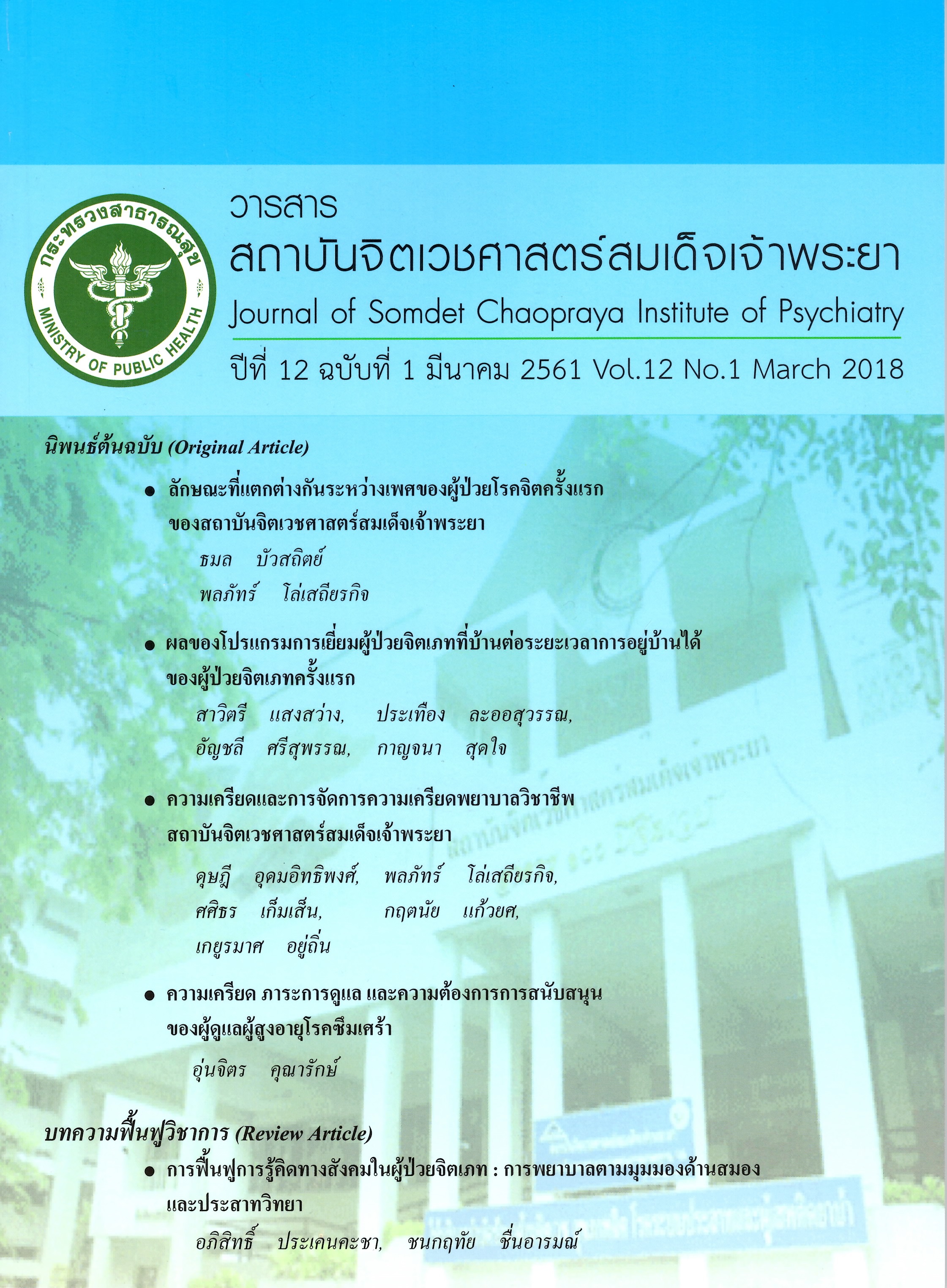ความเครียดและการจัดการความเครียดพยาบาลวิชาชีพ สถาบันจิตเวชศาสตร์สมเด็จเจ้าพระยา
Keywords:
stress management, stress, professional nurseAbstract
Objective: To study stress & stress management of nurses at Somdet Chaopraya Institute of Psychiatry. Material and Methods: This is a cross sectional descriptive study. The sample included 144 registered nurses working in the inpatient, outpatient and emergency department during October - December 2016. The data were collected by using the questionnaires including personal data, Stress-5 questionnaires (ST-5) and stress coping questionnaire. The prevalence of stress level was presented by frequency and percentage, and the association between stress management and stress level was analyzed by using chi- square test at the p-value 0.05. Results: From 144 registered nurse worked in psychiatric inpatient and outpatient, emergency department, 139 of them responded the questionnaires (96.5%). Most of the respondents were females 89.2%, aged < 40 years (mean age 37.4 ± 10.4). 59.7% had a bachelor of nursing degree, 73.4% without chronic diseases. 48.2% were registered nurse, professional level. 89.9% were majority of nurses in psychiatric wards. 48.9% had working experience more than 10 years. 67.6% of registered nurse had normal stress levels or no stress level. Considering coping aspects: accepting the truth 91.4%, followed by social support seeking 61.9% were rated on always/often. The correlation scores determined with stress problems or with stress disease among nurses were statistically significant to use coping aspect of the distortion of truth. Conclusion: Most coping considered each aspects used by registered nurse were accepting the truth, followed by social support seeking. Using coping of the distortion of truth was correlated to cases with stress problems or stress diseases.References
Karasek R, Theorell T. Healthy work: stress, productivity and the reconstruction of working life. New York: Basic Books; 1990.
สมชัย ตั้งพร้อมพันธ์. การบริหารความเครียดของผู้น้ำ. กรุงเทพฯ : โรงพยาบาลเกษมราษฎร; 2556.
Sawaengdee K, Teerawanviwat D, Lorchirachoonkul V, Jitthavech J. Working life table of registered nurses in Thailand. Thai Population Journal 2009; 1: 73-93.
วิจิตร ศรีสุพรรณ, กฤษดา แสวงดี. ข้อเสนอเชิงนโยบายในการแก้ปัญหาการขาดแคลนพยาบาลวิชาชีพในประเทศไทย. วารสารสภาการพยาบาล 2555; 27(1): 5-12.
Ayomi MB. Factors affecting nurses’ workplace stress Inyowari hospital of Sentani District, Jayapura. International conference on social science and biodiversity of Papua and Papua New Guinea 2016: Jayapura, Indonesia.
Sailaxmi G, Lalitha K. Impact of a stress management program on stress perception of nurses working with psychiatric patients. Asian J Psychiatr 2015; 14: 42-5.
Abdalrahim AA. Stress and coping among psychiatric nurse. Middle East J Nur 2013; 7(4): 30-7.
Barutcu CD, Ergin S. Examination of professional commitment and stress management among nurses from different generations. Int J of Caring Sci 2017; 10(1): 456-63.
Godwin A, Suuk LA, Selorm FH. Occupational stress and its management among nurses at St. Dominic hospital, Akwatia, Ghana. Health Sci J 2016; 10(6): 1-7.
Nualsuwan K, Prasittivatechakool A, Prajankett O. Stress and coping strategies of the Royal Thai Army new privates. J Royal Thai Army Nurs 2012; 13(2): 72-81.
Sizer FS, Whitney E. Nutrition: Concepts and controversies. Belmont, CA: Wadsworth Cengage Learning; 2011. 12. ภิรญา ราชสันเทียะ, ปิยดิถิ์ เจริญสุข. ความสุขของพยาบาลสถาบันจิตเวชศาสตร์สมเด็จเจ้าพระยา. วารสารสถาบันจิตเวชศาสตร์สมเด็จเจ้าพระยา 2559; 10(1): 1-14.
Zhou B. Factors affecting nurses’ work burnout: a case study of Bangkok metropolitan authority’s medical college hospital and Vajira hospital [Master thesis]. Bangkok: National Institute of Development Administration; 2009.
Silpakit O. Srithanya stress scale. J Ment Health Thai 2010; 16(3): 177.
Boonperm N. Stress and coping of Thai traditional medicine students of Rajamangala University of Technology Thanyaburi [Master thesis]. Nakhon Prathom: Silpakorn University; 2014.
Sharifah ZSY, Afiq IM, Chow CY, Siti SD. Stress and its associated factors among in-patient ward nurses in a public hospital in Kuala Lumpur. Malaysian J Pub Health Med 2011; 11(1): 78-85.
Mwinga C, Mugala D. Prevalence and causes of stress among nurses at Ndola Central Hospital – A nurses’ perspective. Int J Novel Res Healthc Nurs 2015; 2(3): 158-65.
Cheung T, Yip PSF. Depression, anxiety and symptoms of stress among Hong Kong nurses: a cross-sectional study. Int J Environ Res Public Health 2015; 12: 11072-100.
Lazarus RS, Folkman S. Stress appraisal and coping. New York: Springer; 1984.
Engel GL. Psychologial development in health and disease. Philadelphia: W.B. Saurdevs Co; 1962.
Lertsakornsiri M. The stress, stress management of nursing students during practice in the labor room. Kuakarun J Nurs 2015; 22(1): 7-16.
Bunpoon A, Sonsupap R. Journal of finance, investment, marketing and business management 2014; 4(1): 316-30.
Siangpror P, Rawiworrakul T, Kaewboonchoo O. Factors correlated to job stress among nurses in specialised cancer hospitals, central region of Thailand. J Health Sci Res 2014; 8(1): 17-27.
Ohue T, Moriyama M, Nakaya T. The Effect of the group cognitive behavior therapy in a nurse’s burnout and. Health 2015; (7): 1243-54.
Happell B, Reid-Searl K, Dwyer T, Caperchione CM, Gaskin CJ, Burke KJ. How nurses cope with occupational stress outside their workplaces. Collegian 2013; 20(3): 195-9.
McMeekin DE, Hickman RL Jr, Douglas SL, Kelley CG. Stress and coping of critical care nurses after unsuccessful cardiopulmonary resuscitation. Am J Crit Care 2017; 26(2): 128-35.
Shehata AMGH, Ramadan FH. Relationship between Emotional Regulation Strategies and self–reported ego defense styles among nursing interns at Alexandria, Main university hospital. J Nurs Health Sci 2017; 6(1): 14-23.
Malone JC, Cohen S, Liu SR, Vaillant GE, Waldinger RJ. Adaptive midlife defense mechanisms and late-life health. Personal Individ Differ 2013; 55(2): 85-9.
Downloads
Published
How to Cite
Issue
Section
License
The articles published are copyright of Journal of Somdet Chaopraya Institute of Psychiatry.



